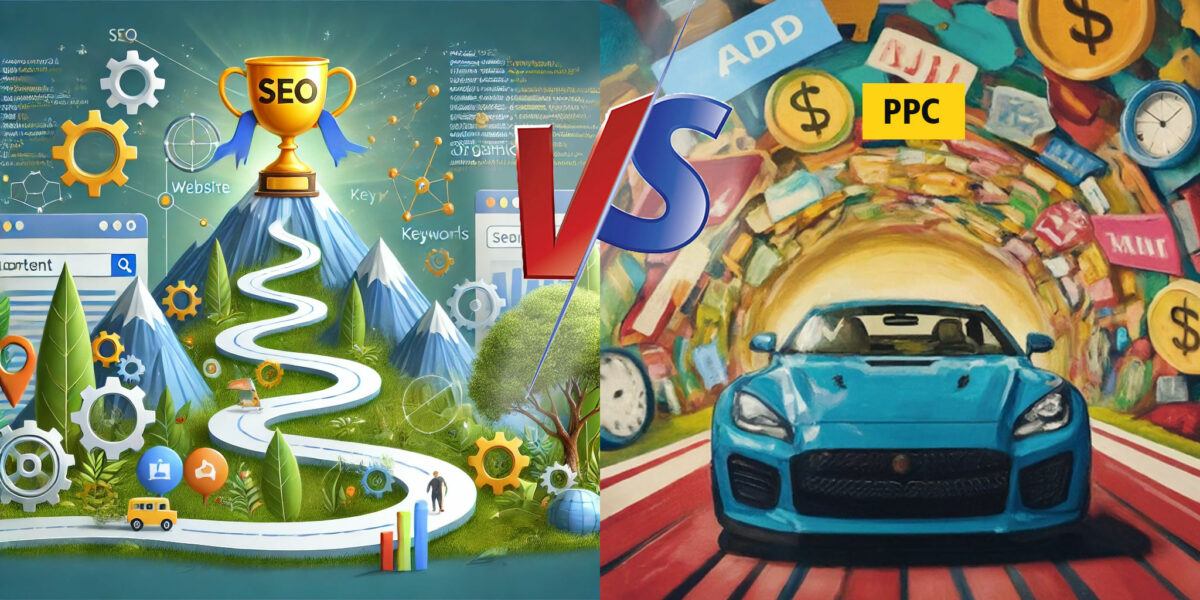
Which Is Right For Your Business?
SEO Vs. PPC
- Josh
- 20/Aug/2024
Navigating the digital marketplace can feel like a maze, and figuring out where to spend your marketing budget is key. SEO or PPC, which is better? Both search engine optimization (SEO) and pay-per-click (PPC) advertising are powerful tools to boost your business’s traffic and sales. But what exactly are they, and how do they differ? Let’s break it down.
Defining SEO (Search Engine Optimization) and its long-term benefits
SEO is optimizing your website to rank naturally in search engine results pages (SERPs) without directly paying for placement. This approach focuses on creating high-quality content, optimizing website technical elements, and establishing a strong web presence to attract a steady flow of traffic over time.
Explaining PPC (Pay-Per-Click) and immediate traffic advantages
PPC, on the other hand, involves placing ads on search engines where you pay a fee each time your ad is clicked. This model offers the advantage of instantly boosting visibility and driving targeted traffic to your site but with the trade-off of ongoing costs.
Both SEO and PPC are vital to increasing online visibility, but they serve different purposes in your marketing strategy. While SEO builds a foundation of credibility and organic audience growth, PPC can quickly capture the attention of potential customers who are ready to convert.
Integrating these approaches into your sales funnel can be a defining factor for success. Investing in SEO could lead to a valuable online domain that garners high traffic levels, while PPC can capture sales and leads when a quick market entry or timely promotion is required.
Businesses often need to weigh budget considerations against the expected return on investment for both SEO and PPC. While SEO generally requires a larger upfront investment of time and resources with slower initial results, it may provide a more substantial and lasting impact without the need for continual spending.
In the following section, we will demystify the intricacies of SEO and help you understand whether organic growth is the most advantageous path for your business.
Analyzing SEO: Is Organic Growth the Best Path for You?
When you hear about organic growth online, it typically refers to SEO. SEO is about optimizing your website to rank higher in search engine results pages, naturally increasing visibility and traffic over time. Unlike PPC, SEO doesn’t offer instant results; it’s a marathon, not a sprint. You’ll need to be patient as it can take months, sometimes even longer, to see significant traction.
One of the primary advantages of SEO is the development of trust and credibility with your audience. Users tend to trust organic search results more than ads, so ranking high organically can cement your business as an authority in your field. This trust can be invaluable, especially when considering the lifecycle value of a customer.
To determine if SEO is the right choice, start by pinpointing your target audience. Does organic search play a significant part in their buying process? If your audience relies heavily on research and tends to seek educational content before making a purchase, SEO might be an effective strategy for your business.
Next, consider the success stories. Diverse businesses, from local boutiques to global e-commerce platforms, have leveraged SEO to enhance their visibility and sales over the years. These case studies often reveal that strategic content creation, keyword optimization, and a user-friendly site structure are pivotal to SEO success.
Finally, weigh the costs and scalability. Initial SEO efforts can be resource-intensive, involving content creation, site optimization, and link building. However, once established, the incremental costs can be quite manageable, and scaling up often doesn’t require a proportional increase in budget.
Deciphering PPC: Fast Results, But at What Cost?
Immediate gratification can be alluring. I appreciate that. When it comes to PPC, the allure is the promise of quick results. Your advertisement pops up on search engines or social platforms, and bam — you notice an influx of traffic. But, as with most things, immediate results come with their own price tag.
The true cost of PPC isn’t just the literal price you pay per click. It’s necessary to consider the bidding wars for popular keywords, which can sky-rocket your expenses. Moreover, there’s the constant monitoring and optimizing of campaigns to prevent wasted ad spend and to keep conversion rates high.
But PPC isn’t just about the spending; it’s also about precision. For some businesses, especially those with a high customer lifetime value or those running time-sensitive promotions, PPC is a powerful tool. It lets you target potential customers based on exact keywords, demographics, interests, and even the time of day.
Real-world success stories abound. Consider the launch of a new tech gadget. The company opts for a PPC campaign to capitalize on the release hype, resulting in immediate high sales. But imagine a different scenario where a small business exhausts its limited budget on an aggressive PPC campaign with little return — caution is warranted.
Thus, weighing the ongoing financial commitment is essential. While PPC can provide a boost, it requires a steady and often substantial investment to maintain momentum. Balancing your expectations with a realistic understanding of your business’s financial agility is crucial.
F A Q
- SEO (Search Engine Optimization): It’s about improving organic search visibility. You optimize your website to rank higher in search results without paying for clicks.
- PPC (Pay-Per-Click): It’s paid advertising. You bid on keywords, and your ads appear at the top of search results. You pay when someone clicks on your ad.
- SEO: Long-term investment, free clicks, but requires time and effort.
- PPC: Immediate results, but costs money per click.
- SEO: Takes time (months) to see significant results.
- PPC: Immediate results once you start running ads.
- SEO Pros: Free traffic, long-term benefits.
- SEO Cons: Slower, uncertain rankings.
- PPC Pros: Immediate visibility, precise targeting.
- PPC Cons: Costs money, stops when budget ends.
That’s a great point! While Pay-Per-Click (PPC) advertising doesn’t directly influence your site’s organic search rankings, it can still play a crucial role in enhancing your SEO efforts. For example, PPC campaigns can drive traffic to your site, providing valuable data on user behavior and keyword performance. This information can then be used to refine your SEO strategies, making them more effective.
- Yes! Combining both strategies can maximize visibility and traffic.
Lot of business executives lack a basic understanding of how important the keyword research and search intent are, to conduct an effective SEO strategy.
Passive Income: The first question that comes to mind is: “What type of income Kowen as passive income?”, “How to make passive income online?” And “is it possible?” Yes, it is possible to make passive income online, but it requires some upfront effort to set up.


